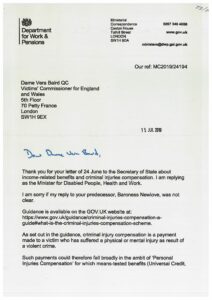Letter from DWP on income-related benefits and criminal injuries compensation
Overview
The VC was approached on behalf of victims worried about making a claim for criminal injuries compensation and whether it might affect their entitlement to means tested benefits. The VC asked the Department for Works and Pensions for clarification on how compensation would be taken into account in assessing whether the capital threshold for claiming means tested benefits has been exceeded. Attached is the response.
Letter
Dear Dame Vera Baird
Thank you for your letter of 24 June to the Secretary of State about income-related benefits and criminal injuries compensation. I am replying as the Minister for Disabled People, Health and Work.
I am sorry if my reply to your predecessor, Baroness Newlove, was not clear.
Guidance is available on GOV.UK website at: https://www.gov.uk/guidance/criminal-injuries-compensation-a-guide#what-is-the-criminal-injuries-compensation-scheme.
As set out in the guidance, criminal injury compensation is a payment made to a victim who has suffered a physical or mental injury as a result of a violent crime.
Such payments could therefore fall broadly into the ambit of ‘Personal Injuries Compensation’ for which means-tested benefits (Universal Credit, Income Support and Jobseeker’s Allowance) have provisions to be disregarded.
Universal Credit
The Universal Credit Regulations 2013 provide for a disregard for payments received by claimants as a ‘Personal Injuries Compensation’. Compensation payments for personal injury can be paid as either capital or regular payments.
Where a sum has been awarded as a consequence of a personal injury to a claimant and been used to purchase an annuity, the value of the annuity is disregarded.
If the sum is held in trust, any capital of the trust derived from that sum is disregarded.
If the sum is administered by the court, or can only be disposed of by direction of the court, it is disregarded.
If the sum has been paid within the past 12 months, and is not held in trust or has not been used to purchase an annuity [or otherwise disposed of], that sum is to be disregarded from the calculation of the claimant’s capital. That is, personal injury payments can only be disregarded for 12 months if they are not placed in a trust etc.
Jobseeker’s Allowance
Jobseeker’s Allowance Regulations 1996 also provide for payments which qualify as ‘Personal injury Compensation’ to be disregarded.
Sums paid into a personal injury trust qualify to be disregarded in the calculation of income other than earnings.
Payments can be disregarded if they are ‘received by virtue of any agreement or court order to make payments to the claimant in consequence of any personal injury to the claimant’.
Lump sum capital payments paid directly can also be disregarded, but this disregard applies only for a period of 52 weeks beginning with the day on which the claimant first receives any payment in consequence of that personal injury. The disregard for capital payments also only applies for the first payment and will not apply to a second payment in consequence of the same injury.
Income support
Income Support (General) regulations 1987 provide for disregards for payments that qualify as ‘Personal Injury Compensation’.
A payment made to a claimant or their partner in consequence of any personal injury to the claimant or their partner can be disregarded for 52 weeks from when the claimant or their partner first receives any payment. The disregard does not apply to a subsequent payment made for the same injury to the claimant or their partner.
The disregard does not apply to any payment from a trust fund where the funds derive from a payment made in consequence of any personal injury.
If administered through a trust fund, the value of a trust fund and right to receive payment under that fund will be disregarded, when the fund has been set up using payments made in consequence of a personal injury.
I hope you will find this reply helpful.
Kind regards
Justin Tomlinson MP, Minister for Disabled People, Health and Work

